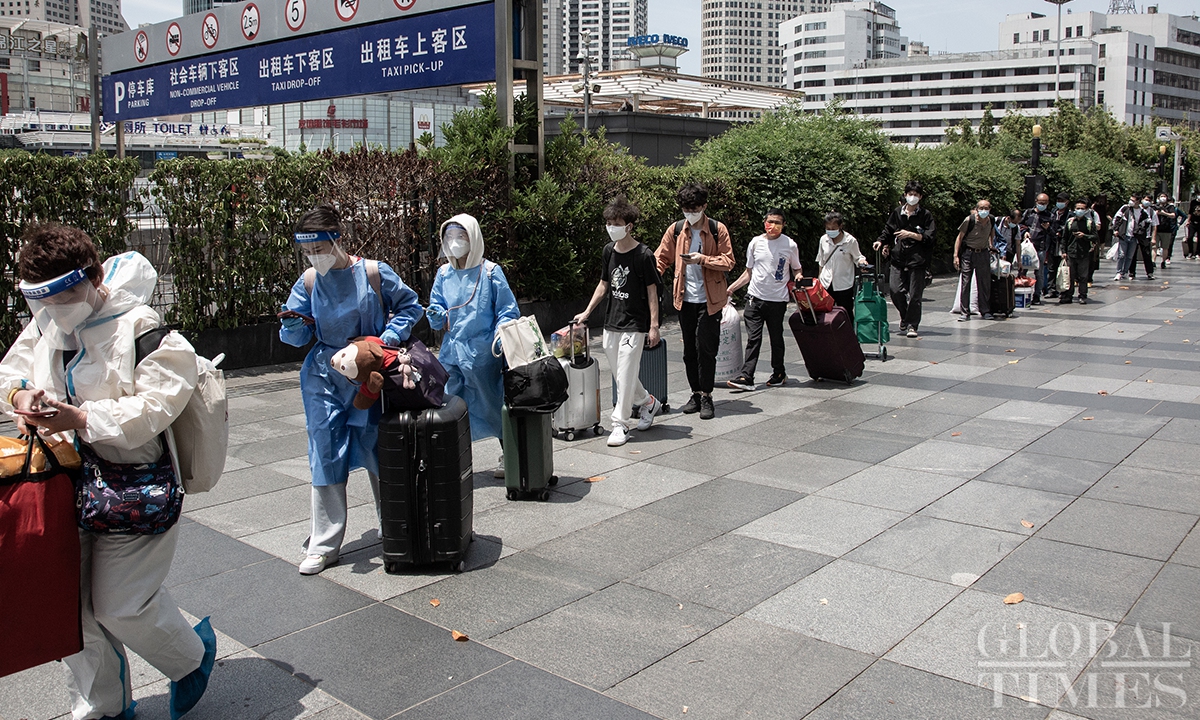
Shanghai Railway Station Photo: Wu Shiliu/GT
Along with the easing of recent COVID-19 resurgences, China's tourism industry is expected to see a rebound during the upcoming Dragon Boat Festival, with total trips across the country jumping at least 20 percent, experts and industry insiders said on Monday.Ahead of the three-day holiday, many Chinese localities have recently announced the resumption of inter-provincial tour groups, while two of China's megacities that have been hit by recent COVID-19 outbreaks - Beijing and Shanghai - are also relaxing strict anti-epidemic measures and picking up business resumptions.
The Beijing municipal government said on Saturday that hotels, homestays and agritourism farms in five of the capital's suburban areas were allowed to resume business from Sunday.
Following the announcement, searches for homestays in Beijing's outskirts via Chinese short-term lodging rental platform Tujia soared by 200 percent day-on-day as of noon on Sunday, according to data Tujia sent to the Global Times.
Xiao Tong, a homestay owner in Beijing's Huairou district, said that on Sunday she received bookings for the Dragon Boat Festival holiday, and was waiting for a formal notice from the district government for business resumption.
Searches for hotels in Beijing's suburban areas on domestic online travel agency (OTA) Qunar jumped by 100 percent on Sunday.
In addition, thanks to the easing of travel restrictions across provinces and cities, there is also a strong desire among residents to take long-distance trips.
Sales of train tickets for the first day of the three-day holiday (from Friday to June 5) started on Monday, and bookings for tickets increased over 20 percent day-on-day as of Monday at noon, according to data Qunar sent to the Global Times.
It showed that over 85 percent of people would travel within provinces, with South China's Guangdong Province, East China's Zhejiang Province and Southwest China's Sichuan Province posting remarkable growth in train ticket sales.
"There may be a significant rebound of at least 20 percent compared with the May Day holiday, as residents in populous cities, including Beijing and Shanghai, are eager to go for a trip after staying home for months," Li Changan, professor of the Academy of China Open Economy Studies at the University of International Business and Economics, told the Global Times on Monday.
Local governments' targeted measures to boost domestic consumption and support the economy would also contribute to the fast recovery of the tourism industry, he said.
On Sunday, South China's Hainan Province, which is known as an international tourism island and trade port, released a package of extraordinary measures with 10 themes to promote the recovery of the tourism industry.
From June to August, the province will hand out travel vouchers worth more than 10 million yuan ($1.5 million) by joining with OTAs, including Qunar and Trip.com, as well as airlines, duty-free stores and financial institutions, according to a statement on the local government website.
As the last segment of the pandemic-hit services sector that's awaiting recovery, the restart of the tourism industry will in turn inject confidence into consumers, Li said, while calling for increasing residents' incomes and giving out vouchers and targeted subsidies to spur consumption.
At least 19 provinces and municipalities in China have handed out consumption coupons worth 5 billion yuan, which will inject fresh momentum into on-site consumption and rapidly boost the consumption demand of local residents.
Chen Jia, a college teacher based in Lianyungang, East China's Jiangsu Province, told the Global Times on Monday that she spent the 200-yuan digital voucher provided by the local government at a restaurant on Saturday, as the voucher was only good for several days.
"With the voucher, I only spent 30 yuan more for a meal," Chen said, noting that the "great deal" also encouraged her to stroll around in a nearby shopping mall, where she bought one shirt and a new pair of sunglasses.
Chen said she's already planning the next meal out, since her husband also grabbed some digital vouchers during the weekend.
Recently, Shenzhen ramped up efforts to support a sustainable economic recovery by coming up with measures in nine aspects, including granting subsidies of up to 20,000 yuan for residents who buy new-energy vehicles and up to 2,000 yuan for those buying home appliances and smartphones. It's estimated that these payments will drive consumption of about 45 billion yuan.
As a major driver of China's economy, consumption will continue to serve as a ballast stone for stable economic growth this year despite challenges posed by COVID-19 resurgences, Li said.
According to the National Bureau of Statistics, final consumption expenditure contributed 69.4 percent of GDP in the first quarter of 2022.



